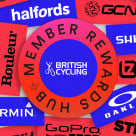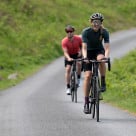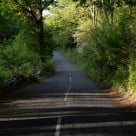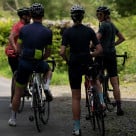 Nutrition - Your questions answered
Nutrition - Your questions answered
We asked you to send in your questions to GB Cycling Team and Team Sky's Head of Nutrition Nigel Mitchell and we've had a great response. Here's a few of them...
Brian - Having just turned 60 I am very fortunate that I am retired and have much more time to train. However with age it takes longer to recover. How should I best manage my diet before and after hard training to optimise recovery?
NM: First things first, it's just as important being physically active when you're older than it is when you're in your younger years. Body composition changes, meaning that muscle mass tends to reduce and fat mass will then increase muscle mass. Exercise when you're getting older is just as vital because it will help maintain that muscle mass and also your body's lean tissue. Nutrition can help but one of the most important factors is to ensure you are eating high quality protein which can be found easily in dairy foods...
- Before a ride - Porridge made with milk supplies high quality protein that helps protect the muscle. It also provides slow release carbohydrates to help fuel the brain and muscles while you're on the bike
- After a ride - Omelette with salad and bread / Tuna Sandwiches / Sardines on toast
Any of the above three meals contain good quality carbohydrate and protein. Though for older people I often advise Omega 3 fats such as oily fish (tuna, mackerel, sardines etc ) because peoples' diets are lower in these types of fats and research has actually shown that the combination of fats and protein can enhance muscle restructure after exercise.
Graham - I seem to spend a lot of money on branded energy and recovery drinks, for my two bike-riding sons and myself. Are there ways to make and take the fluid and the carbs and sugars you need during a ride, without spending a fortune on gels, bars and solutions? Are banana milkshakes good for this?
NM: Yes. A simple electrolyte energy drink can be made by combining fruit juice such as apple juice with equal amounts of water, usually with 1g of salt. My best tip is to pick up salt packs you get at fast food restaurants. For recovery drinks a pint of skimmed milk and a banana are good because they'll have suitable nutrients and as you suggest, any bought milkshake powder with milk can also be beneficial post ride.
My advice though would be to use the pre made products if you can stretch to pay that bit more. They are designed to do the job properly and are much more convenient. It's also worth checking if the products are on special offer. Sometimes they can work out more cost effective than making your own. Most of our athletes find that for convenience and reliability using CNP and Gatorade products provide them with all the high quality ingredients they need.

Ian - I am 49 year old male currently 12 and a half stone and I ride to work every day, which is usually about a 20 mile round trip. However I can't seem to get the extra stone off I would like. Is there any advice you could offer me?
NM: If you're weight is stable, you're in what's called a ‘neutral energy balance'. This basically means that the energy you consume equals what you're using. So in order to lose weight you need to shift into a ‘negative energy balance'. If for example you take 500g of body fat, that's equivalent to 3500 calories. So if you reduce your intake to 500 calories a day you'd lose approximately 1lb of body fat per week.
The easiest way you can do this is to avoid unhealthy snacks like crisps, chocolates and really salty foods. If, however, you already maintain a healthy diet then try and reduce your portion sizes. Any reduction though should be across the day and not avoiding one set meal. If you are already very lean you run the risk of pushing down your lean muscle which may effect performance.
Nigel - Have you any tips/preventative measures for combating the onset of cramp in the quads on longer sportives?
NM: Cramps are more related to conditioning issues. Nutrition can play a role and practicing the correct food/fluid balance can help. Electrolytes are important to maintain a fluid balance within muscle in particular, providing potassium, sodium and magnesium which will may help cramps. For riders who suffer a lot from this, special formulated products such as Gatorlytes can be really beneficial. Another tip would be to estimate your own sweat rate and evaluate the fluid intake you'll need on rides.
Chris - I've been road cycling for two years but seem to have hit a wall. I mainly ride at fast speeds in sportives and plan to start racing. I'm 38 and weigh 85kg but at 6 feet 4 inches my problem seems to be that when I am 88kg I can strengthen my legs and build my fitness, but when I drop my weight to 82-83kg all my muscle gains diminish. I lose weight very quickly and effortlessly by cutting out snacks. How I can get over these issues and drive up my speed and cut weight without muscle loss?
NM: With your current weight being 85kg it could be that because you're close to your minimal body weight, you might be losing lean tissue, meaning that you're also losing muscle. For taller riders it can sometimes be a challenge to get the right power to weight ratio because if you drop below that minimal body weight there's a chance you could be losing muscle mass.
Riders can easily make the mistake of cutting down carbohydrate intake at the wrong times. The reason they're so important is help fuel your body while training. To ensure you get maximum effect from this, eating little and often can help maintain fueling In the evening, try and keep to 50g of carbohydrate may be more beneficial. Using foods with a lower glysemic index can also help.
John - I completed my first 50 miles Time trial last weekend and found it difficult to know how much fluid to take. Having drunk a litre or so before the event, I only managed a bit less than one bottle during the race-taking swigs at each of the 5 turns. I drank another litre after the race. What is the best way to keep hydrated in a time trial event of 25 miles or more?
NM: It's all about you as an individual. Check out what I said last time about your own sweat rate. If the temperature is above 25c then you may need to drink more but generally during a 50 mile TT, one bottle of water should be ample.
Simon - I wondered if you could give me some advice on how to get more protein in my diet. I usually eat an evening meal which includes meat, fish or eggs and the next morning, a porridge and fruit breakfast. My next protein intake will be the midday following the previous evening's meal. I'm relatively light for my height (78kg) I wonder whether I should also be eating protein with my breakfast or whether protein is more effective after exercise to help repair muscle damage?
NM: There are a couple of foods which provide protein in the morning and evening if you're worried your diet doesn't contain enough. A boiled egg or small natural yoghurt will boost protein intake and when you're hungry again mid morning, just drinking a latte or cappuccino coffee will help provide high quality protein. At night, just before you go to bed natural yoghurt will again ensure your protein levels are topped up while you're sleeping.

Nick: How does a typical rider start the day in both training and competition, and do they have tests to check pre race/training hydration levels on a daily basis? You often see riders being handed a coke etc after a stage but what is the re-hydration strategy you would recommend?
NM: We don't want to let them have soft drinks all the time! So at Team Sky we'll monitor it on a daily basis. We'd usually provide the riders with a protein recovery shake which is ideal for rehydration as well as recovery. To be honest though if we're feeling kind, a small can of coke or something in their feed bag will keep them happy!
Lee- I've read studies that showed drinks with 6% carbohydrate empty from the stomach fastest, which make the body rehydrate faster. However, is this optimal for a short road or circuit race (e.g. 24 miles) in cool conditions, where rehydration isn't as important as say, an 80 mile race in hot weather?
NM: You're right, in a shorter race (less than 90mins) in cooler conditions (below 25c) the risk of de- hydration is reduced (this depends on you so it's important to know your body). Blood sugar levels are really important here though and a 6% carbohydrate drink will do the job to help maintain these levels in rides lasting less than 90 minutes. What they also do is aid the performance of your ride - and make sure you're going as fast as you can.
Neil - I train on my bike 3 times a week (either Road or MTB for around 6 hrs per week on the bike). I take my cycling quite seriously at an amateur level. My dentist says the citric acid in my sports drinks are damaging my teeth and I wondered if you can recommend an alternative option or different products to use while training to replenish electrolytes and energy?
NM It's not just sport drinks but soft drinks and fruit juices can also be cariogenic. Make sure you're not having too many sugary drinks outside of exercise. My advice would be to think about what you're drinking on a daily basis. Remember, water is good for you and we should try and get as close to that 3 litres a day as possible. Also, think about diluting your sport drink with water on hot days, something our athletes often do.




